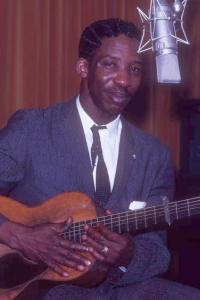| Maxwell Street Jimmy Davis | |
|---|---|
 Davis in 1965 Davis in 1965 | |
| Background information | |
| Birth name | Charles W. Thompson |
| Also known as | Jewtown Jimmy |
| Born | (1925-03-02)March 2, 1925 Tippo, Mississippi, U.S. |
| Died | December 28, 1995(1995-12-28) (aged 70) Chicago, Illinois, U.S. |
| Genres | |
| Occupations |
|
| Instruments |
|
| Years active | 1940s–1995 |
Charles W. Thompson (March 2, 1925 – December 28, 1995), known as Maxwell Street Jimmy Davis, was an American electric blues singer, guitarist, and songwriter. He played with John Lee Hooker, recorded an album for Elektra Records in the mid-1960s, and remained a regular street musician on Maxwell Street, in Chicago, for over 40 years. He is best remembered for his songs "Cold Hands" and "4th and Broad". He was also known as Jewtown Jimmy.
Biography
Davis was born Charles W. Thompson, in Tippo, Mississippi. In his teens, he learned to play the guitar from John Lee Hooker, and the two of them played concerts together in Detroit in the 1940s, following Davis's relocation there in 1946. Prior to his move to Detroit, he had worked in traveling minstrel shows, including the Rabbit Foot Minstrels. Davis lived for nearly a year in Cincinnati, Ohio, before he moved to Chicago in 1953. He started performing regularly in the marketplace area of Maxwell Street, playing a traditional and electrified style of Mississippi blues.
In 1952, he recorded two songs, "Cold Hands" and "4th and Broad", under his real name, for Sun Records. They were offered to Chess Records and Bullet Records but were not released.
It is uncertain when he took the name Jimmy Davis, but in 1964, under that pseudonym, he recorded a couple of tracks for Testament Records. They appeared on the 1965 Testament compilation album Modern Chicago Blues. His songs were "Crying Won't Make Me Stay" and "Hanging Around My Door". The album also included a track from another Chicago street performer, John Lee Granderson, and more established artists, such as Robert Nighthawk, Big Walter Horton, and Johnny "Man" Young. The music journalist Tony Russell wrote that it was "music of great charm and honesty".
In 1966, Davis recorded a self-titled album for Elektra Records, which Jason Ankeny, writing for Allmusic, called "a fine showcase for his powerful guitar skills and provocative vocals". He recorded several tracks for various labels over the years, without commercial success.
Davis owned a small restaurant on Maxwell Street, the Knotty Pine Grill, and performed outside the premises in the summer. He continued to play alfresco on Chicago's West Side for decades. In July 1994, Wolf Records released the album Chicago Blues Session, Vol. 11, the tracks of which Davis had recorded in 1988 and 1989. The collection included Lester Davenport on harmonica and Kansas City Red playing the drums.
Davis died of a heart attack in December 1995, in his adopted hometown of Chicago. He was 70 years old.
A 1989 photograph of Davis performing on Maxwell Street appeared on the front cover of BluesSpeak: The Best of the Original Chicago Blues Annual, published in 2010.
Discography
Albums
| Album title | Record label | Year of release |
|---|---|---|
| Maxwell Street Jimmy Davis | Elektra Records | 1965 |
| Chicago Blues Session, Vol. 11 | Wolf Records | 1989 |
Compilation albums
| Album title | Record label | Year of release |
|---|---|---|
| Modern Chicago Blues | Testament Records | 1965 |
References
- ^ Doc Rock. "The Dead Rock Stars Club 1994–1995". Thedeadrockstarsclub.com. Retrieved January 27, 2014.
- David Whiteis (2006). "DAVIS, "MAXWELL STREET" JIMMY". In Edward M. Komara (ed.). Encyclopedia of the Blues: A-J, index. Taylor & Francis. p. 255. ISBN 9780415927000.
- ^ Ankeny, Jason. "Maxwell Street Jimmy Davis: Biography". AllMusic.com. Retrieved January 27, 2014.
- ^ Walker, Janelle L. (2000). Saving Maxwell Street: People, Power, and the Politics of Urban Aesthetics in Chicago. Ph.D. dissertation. Indiana University. p. 69.
- ^ "Maxwell Street Jimmy Davis". Bluesmusic.lt. Archived from the original on July 22, 2011. Retrieved October 20, 2010.
- Cheseborough, Steve (2009). Blues Traveling: The Holy Sites of Delta Blues (3rd ed.). Upress. p. 209. ISBN 978-1-60473-124-8.
- Room, Adrian (1997). Dictionary of Pseudonyms: 13,000 Assumed Names and Their Origins (5th ed.). Jefferson, North Carolina: McFarland. p. 135. ISBN 978-0-7864-4373-4.
- "Elektra Discography". Atsf.co.uk. Retrieved January 27, 2014.
- ^ Russell, Tony (1997). The Blues: From Robert Johnson to Robert Cray. Dubai: Carlton Books. pp. 200–201. ISBN 1-85868-255-X.
- "Maxwell Street Jimmy Davis, Chicago Blues Session, Vol. 11: Credits". AllMusic.com. Retrieved January 27, 2014.
- Beauchamp, Lincoln T. (2010). BluesSpeak: The Best of the Original Chicago Blues Annual. Urbana and Chicago: University of Illinois Press. ISBN 978-0-252-07692-3.
- "Maxwell Street Jimmy Davis | Discography". AllMusic. Retrieved January 27, 2014.
External links
Categories:- 1925 births
- 1995 deaths
- American blues singers
- American blues guitarists
- American male guitarists
- Songwriters from Mississippi
- Songwriters from Illinois
- Electric blues musicians
- Country blues musicians
- Blues musicians from Mississippi
- Singers from Chicago
- American street performers
- Elektra Records artists
- 20th-century American singers
- 20th-century American guitarists
- Guitarists from Chicago
- Guitarists from Mississippi
- 20th-century American male singers
- American male songwriters
- 20th-century American songwriters